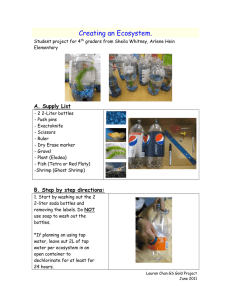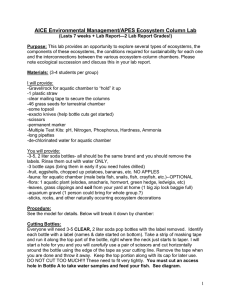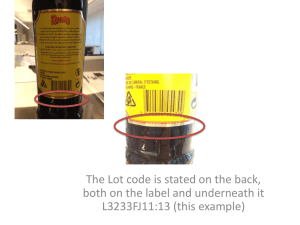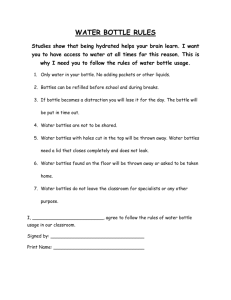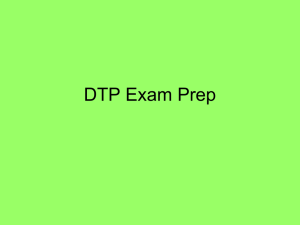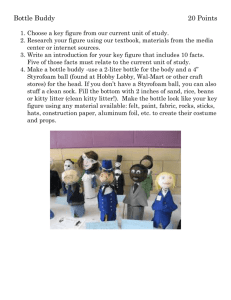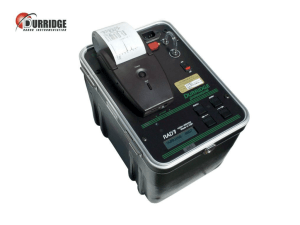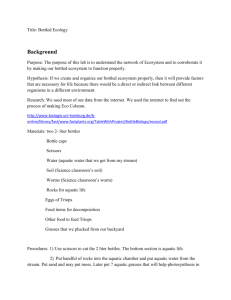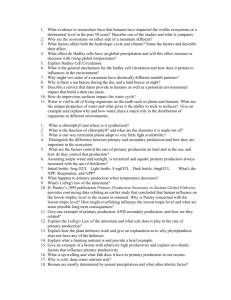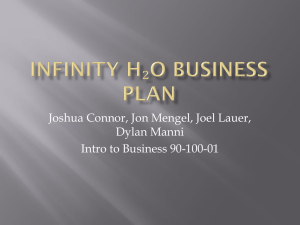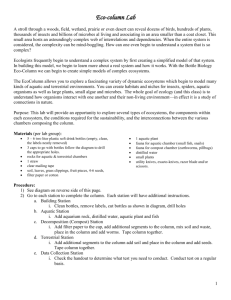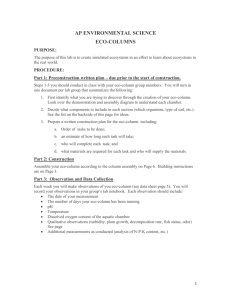Name___________________Period___ Bottle Ecosystem Project
advertisement
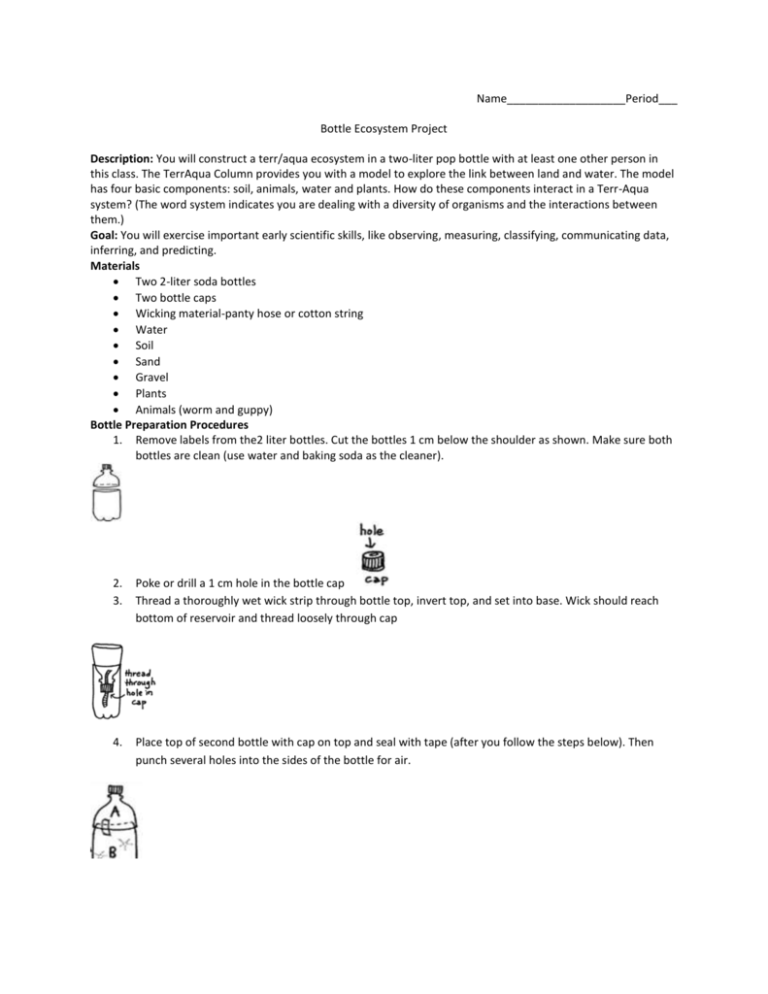
Name___________________Period___ Bottle Ecosystem Project Description: You will construct a terr/aqua ecosystem in a two-liter pop bottle with at least one other person in this class. The TerrAqua Column provides you with a model to explore the link between land and water. The model has four basic components: soil, animals, water and plants. How do these components interact in a Terr-Aqua system? (The word system indicates you are dealing with a diversity of organisms and the interactions between them.) Goal: You will exercise important early scientific skills, like observing, measuring, classifying, communicating data, inferring, and predicting. Materials Two 2-liter soda bottles Two bottle caps Wicking material-panty hose or cotton string Water Soil Sand Gravel Plants Animals (worm and guppy) Bottle Preparation Procedures 1. Remove labels from the2 liter bottles. Cut the bottles 1 cm below the shoulder as shown. Make sure both bottles are clean (use water and baking soda as the cleaner). 2. 3. Poke or drill a 1 cm hole in the bottle cap Thread a thoroughly wet wick strip through bottle top, invert top, and set into base. Wick should reach bottom of reservoir and thread loosely through cap 4. Place top of second bottle with cap on top and seal with tape (after you follow the steps below). Then punch several holes into the sides of the bottle for air. Aquatic habitat Procedures 1. Add a layer of sand or topsoil (2-3 cm) to the deep base. 2. Add a layer of gravel (1-2 cm) on top of the sand or topsoil. 3. Add water to a level about 1 cm below the cap of the inverted deep funnel. 4. Plant aquatic plants in the bottom sediment. A chopstick or skewer will help you push the stems or roots into the ground. 5. Arrange “boulders” and other objects on the bottom sediment. 6. Add floating aquatic plants. 7. Add aquatic animals. Terrestrial habitat Procedures 1. Add a layer (1-2 cm) of gravel to the deep funnel. 2. Mix equal parts of leaf litter and topsoil together, moisten, and add a layer (6-8cm) over the gravel. 3. Add terrestrial animals that burrow to the soil (e.g., worms). 4. Plant terrestrial plants in the soil. 5. Arrange “dead trees” and other objects on the soil. 6. Add terrestrial animals. 7. Establish a “water connection” between the aquatic and terrestrial habitats by holding the terrarium over the aquarium at a slight angle and slowly pouring water down the side of the terrarium until it drips from the “wick” into the aquarium. This is essential to ensure “wicking” action. Maintenance Instructions Provide a light source, preferably indirect window light. A small desk lamp or plant light will work, too. For artificial lights, provide 12 –14 hours of light daily. If you place your project outside, make sure it is in a covered area, so that it does get light, but it is protected from too much of the elements (rain, sun, and other animals). Over a two week period, you will record daily or every other day observations, looking for, plant growth or population changes. Take quantitative measurements (exactly how many? exactly what size? how many days?) as well as qualitative (what color? what shape? slow or quick movement?). You must turn in the following for evaluation: Picture of your bottle habitat at the beginning of the two weeks and at the end of the two weeks. (Pictures can be one set per group as long as all names are written somewhere on the picture. Daily observations of your habitat, including dates and specific information in a data table (set up in the space provided below). A written summary to include the following: o Define an ecosystem o Explain what you think is the purpose of this activity. Was this purpose met? o Did any changes in your system happen (growth, death, something new appear, etc)? If so please explain and or give data to add to validity. o Any changes you would do the next time. Data Table Area: Summary: __________________________________________________________________________________________ __________________________________________________________________________________________ __________________________________________________________________________________________ __________________________________________________________________________________________ __________________________________________________________________________________________ __________________________________________________________________________________________ __________________________________________________________________________________________ __________________________________________________________________________________________ __________________________________________________________________________________________ __________________________________________________________________________________________ __________________________________________________________________________________________ __________________________________________________________________________________________ __________________________________________________________________________________________ __________________________________________________________________________________________ __________________________________________________________________________________________ __________________________________________________________________________________________ __________________________________________________________________________________________ __________________________________________________________________________________________ __________________________________________________________________________________________ __________________________________________________________________________________________ __________________________________________________________________________________________ __________________________________________________________________________________________ __________________________________________________________________________________________ __________________________________________________________________________________________ __________________________________________________________________________________________ __________________________________________________________________________________________ __________________________________________________________________________________________ __________________________________________________________________________________________ __________________________________________________________________________________________ Bottle Ecosystem Grade Rubric CATEGORY 4 3 2 1 Purpose/Problem (10 pts) Purpose of the project is well stated, clear and accurate Purpose of the project is somewhat stated, and accurate Purpose of the project is vague, unclear and/or inaccurate Purpose of the project is missing Design (set-up) (10pts) All steps in the procedure were followed accurately and the design is neat and clean Most steps in the procedure were accurately followed and the design is neat and clean Few steps in the procedure were followed and the design is unkempt and dirty Steps in the procedure were not followed and design is unkempt and dirty Pictures Both beginning and ending pictures were provided for your ecosystem. Only one picture provided (either beginning or end) of your ecosystem. Data: Observations (30 points) Data was collected over the entire two weeks on a daily or every other day basis. Observations are clearly described. Metric system used for measurements Data was collected for more than one week. Observations are clearly described. Metric system used for measurements Data was collected Data was not for less than a collected week. Observations were not clear and/or incomplete. Metric system is not used for measurements Conclusion/Summary (40 pts) Student provided a detailed conclusion clearly based on the data and related to all areas that were to be covered. Student provided a somewhat detailed conclusion clearly based on the data and related to the areas to be covered Student provided a conclusion with some reference to the data and most areas covered. No pictures provided. No conclusion was apparent OR important details were overlooked. Teacher comments: _____________________________________________________________________________________________ _____________________________________________________________________________________________ _____________________________________________________________________________________________ _____________________________________________________________________________________________ _____________________________________________________________________________________________ _____________________________________________________________________________________________ _____________________________________________________________________________________________ _____________________________________________________________________________________________ _____________________________________________________________________________________________
